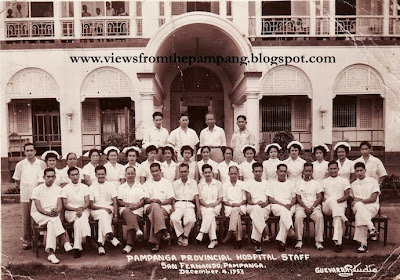When the Americans came to the Philippines, they found a country plagued by many tropical diseases, a population with a high mortality rate brought about mainly by poor public sanitation. Immediately, through the colonial government, through its Bureau of Health, embarked on a nationwide health program that included introducing waste disposal through sewage systems, community vaccinations and fumigations, and of course, the building of puericulture centers and hospitals.
Pampanga’s premier hospital was inaugurated in 1931 as Pampanga General Hospital in Dolores, San Fernando. The spanking new 2-storey hospital was located about 2 kilometers from the heart of the capital town, and was considered as one of the most beautiful concrete buildings in the whole province. The modern hospital had a 50-bed capacity, but can accommodate up to 70 patients. It had separate wards for male, female and children patients. There was also a charity ward to treat indigent patients for free.
The Pampanga General Hospital was well-equipped with the latest apparatus of the period, both in the operating room and in the clinical laboratory. Previous to this, Pampanga’s only other health facilities were the 20-bed Pasumil hospital in Del Carmen and a large puericulture center in Bacolor, thus, the opening of Pampanga General Hospital was most welcomed. It became Pampanga’s premier center of health and wellness, attracting patients from all over Central Luzon and improving the lives of millions, through the years.
Today, the hospital has become part of the expanded Jose B. Lingad Memorial Hospital, named in memory of Pampanga’s former governor and congressman who was imprisoned and murdered during the Marcos regime. Since then, rival hospitals with leading edge medical facilities and services have sprouted in nearby Angeles City, but the provincial hospital continues to be a viable alternative especially to those who cannot afford quality medical care.
In June 2013, however, the expansion of Jose B. Lingad Memorial Hospital was launched, with the groundbreaking of 2 six-storey obstetrics-gynecology, pediatric and medical arts building. With the new structure, the bed capacity is expected to double from its current 250 to 500. This was envisioned to be just a kick-off of a more ambitious, much extensive 4-year expansion program for the hospital, so it can deliver quality medical and health services that everyone in the region deserves.









No comments:
Post a Comment